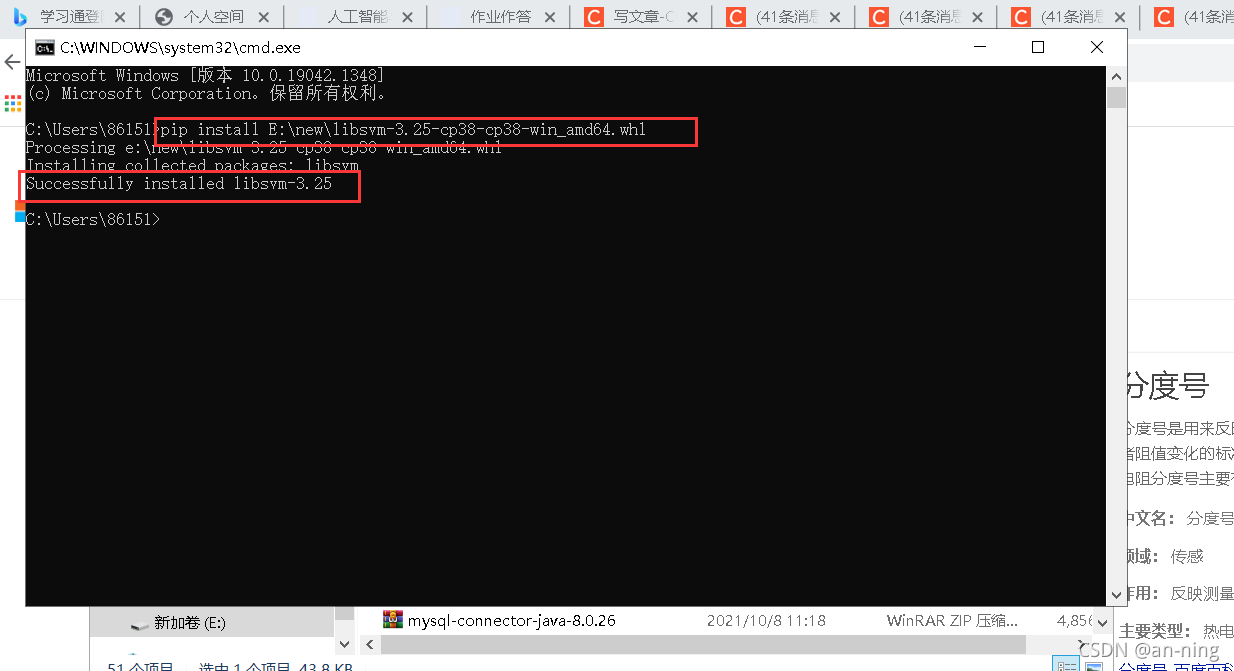1、训练并写出决策函数的数学公式
1.1、下载安装libsvm
????1、进入libsvm官网下载libsvm的包
????2、然后下载libsvm的whl文件,然后再使用pip命令安装libsvm
下载地址:https://www.lfd.uci.edu/~gohlke/pythonlibs/#libsvm

1.2、训练制作的数据集
????1、手工制作一个 两个特征的二分类的Iris数据集,首先进入windows文件夹,打开svmtoy.exe文件
????2、在打开的程序里面使用鼠标随机点击形成数据集
注意:生成数据集的时候使用两种颜色,否则后面不好处理

????3、然后点击保存将数据集保存为文本文档格式,冒号前面的1,2指的是特征

????4、导入包并读取数据,svm_read_problem函数的作用是读取刚刚生成的文件并返回合适的格式便于训练
生成的文件

多项式核的
from libsvm.svmutil import *
from libsvm.svm import *
import scipy.spatial
#根据文件路径直接返回要使用的数据格式
label,data= svm_read_problem('D:\\word\\iris.txt')#训练数据
p_label,p_data=svm_read_problem('D:\\word\\predict.txt')#预测数据

????高斯核的
from libsvm.svmutil import *
from libsvm.svm import *
import scipy.spatial
#根据文件路径直接返回要使用的数据格式
label,data= svm_read_problem('E:\\libsvm\\iris.txt')#训练数据
p_label,p_data=svm_read_problem('E:\libsvm\\predict.txt')#预测数据
para ='-t 2 -c 4 -b 1'
'''
-t
0为线性核
1为多项式核
2为高斯核(默认)
'''
#多项式核
model=svm_train(label,data,para)
svm_save_model('E:\libsvm\\gaosi.txt',model)
acc=svm_predict(p_label,p_data,model)

????5、决策函数:
公式:f(x)=SV*x+rho
SV:所有的支持向量
rho:决策函数中的常数项的相反数
SV的值在生成的txt文件内。
2、建立人脸识别数据集
2.1、采集人脸数据集
????1、使用电脑自带的摄像头采集人脸数据
# -*- coding: utf-8 -*-
"""
Spyder Editor
This is a temporary script file.
"""
import random
from cv2 import cv2 as cv2
import os
import dlib
from skimage import io
import csv
import numpy as np
# 存储位置
output_dir = 'D:/631907060432/face'
size = 64
if not os.path.exists(output_dir):
os.makedirs(output_dir)
# 改变图片的亮度与对比度
def relight(img, light=1, bias=0):
w = img.shape[1]
h = img.shape[0]
#image = []
for i in range(0,w):
for j in range(0,h):
for c in range(3):
tmp = int(img[j,i,c]*light + bias)
if tmp > 255:
tmp = 255
elif tmp < 0:
tmp = 0
img[j,i,c] = tmp
return img
#使用dlib自带的frontal_face_detector作为我们的特征提取器
detector = dlib.get_frontal_face_detector()
# 打开摄像头 参数为输入流,可以为摄像头或视频文件
camera = cv2.VideoCapture(0)
index = 1
while True:
if (index <= 20):#存储20张人脸特征图像
print('Being processed picture %s' % index)
# 从摄像头读取照片
success, img = camera.read()
# 转为灰度图片
gray_img = cv2.cvtColor(img, cv2.COLOR_BGR2GRAY)
# 使用detector进行人脸检测
dets = detector(gray_img, 1)
for i, d in enumerate(dets):
x1 = d.top() if d.top() > 0 else 0
y1 = d.bottom() if d.bottom() > 0 else 0
x2 = d.left() if d.left() > 0 else 0
y2 = d.right() if d.right() > 0 else 0
face = img[x1:y1,x2:y2]
# 调整图片的对比度与亮度, 对比度与亮度值都取随机数,这样能增加样本的多样性
face = relight(face, random.uniform(0.5, 1.5), random.randint(-50, 50))
face = cv2.resize(face, (size,size))
cv2.imshow('image', face)
cv2.imwrite(output_dir+'/'+str(index)+'.jpg', face)
index += 1
key = cv2.waitKey(30) & 0xff
if key == 27:
break
else:
print('Finished!')
# 释放摄像头 release camera
camera.release()
# 删除建立的窗口 delete all the windows
cv2.destroyAllWindows()
break

2.2、建立特征数据集
????1、获取特征数据并保存
# 从人脸图像文件中提取人脸特征存入 CSV
# Features extraction from images and save into features_all.csv
# return_128d_features() 获取某张图像的128D特征
# compute_the_mean() 计算128D特征均值
from cv2 import cv2 as cv2
import os
import dlib
from skimage import io
import csv
import numpy as np
# 要读取人脸图像文件的路径
path_images_from_camera = "D:/631907060432/"
# Dlib 正向人脸检测器
detector = dlib.get_frontal_face_detector()
# Dlib 人脸预测器
predictor = dlib.shape_predictor('shape_predictor_68_face_landmarks.dat')
# Dlib 人脸识别模型
# Face recognition model, the object maps human faces into 128D vectors
face_rec = dlib.face_recognition_model_v1('dlib_face_recognition_resnet_model_v1.dat')
# 返回单张图像的 128D 特征
def return_128d_features(path_img):
img_rd = io.imread(path_img)
img_gray = cv2.cvtColor(img_rd, cv2.COLOR_BGR2RGB)
faces = detector(img_gray, 1)
print("%-40s %-20s" % ("检测到人脸的图像 / image with faces detected:", path_img), '\n')
# 因为有可能截下来的人脸再去检测,检测不出来人脸了
# 所以要确保是 检测到人脸的人脸图像 拿去算特征
if len(faces) != 0:
shape = predictor(img_gray, faces[0])
face_descriptor = face_rec.compute_face_descriptor(img_gray, shape)
else:
face_descriptor = 0
print("no face")
return face_descriptor
# 将文件夹中照片特征提取出来, 写入 CSV
def return_features_mean_personX(path_faces_personX):
features_list_personX = []
photos_list = os.listdir(path_faces_personX)
if photos_list:
for i in range(len(photos_list)):
# 调用return_128d_features()得到128d特征
print("%-40s %-20s" % ("正在读的人脸图像 / image to read:", path_faces_personX + "/" + photos_list[i]))
features_128d = return_128d_features(path_faces_personX + "/" + photos_list[i])
# print(features_128d)
# 遇到没有检测出人脸的图片跳过
if features_128d == 0:
i += 1
else:
features_list_personX.append(features_128d)
i1=str(i+1)
add="D:/631907060432/"+i1+".csv"
print(add)
with open(add,"w",newline="") as csvfile:
writer1 = csv.writer(csvfile)
writer1.writerow(features_128d)
else:
print("文件夹内图像文件为空 / Warning: No images in " + path_faces_personX + '/', '\n')
# 计算 128D 特征的均值
# N x 128D -> 1 x 128D
if features_list_personX:
features_mean_personX = np.array(features_list_personX).mean(axis=0)
else:
features_mean_personX = '0'
return features_mean_personX
# 读取某人所有的人脸图像的数据
people = os.listdir(path_images_from_camera)
people.sort()
with open("D:/test.csv", "w", newline="") as csvfile:
writer = csv.writer(csvfile)
for person in people:
print("##### " + person + " #####")
# Get the mean/average features of face/personX, it will be a list with a length of 128D
features_mean_personX = return_features_mean_personX(path_images_from_camera + person)
writer.writerow(features_mean_personX)
print("特征均值 / The mean of features:", list(features_mean_personX))
print('\n')
print("所有录入人脸数据存入 / Save all the features of faces registered into: D:/Face/get_features_all.csv")
????1、采集数据

????2、采集到的数据

????3、其中的一组数据值

????4、平均特征数组
